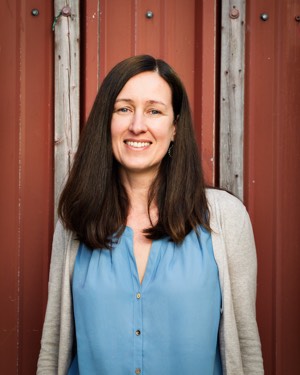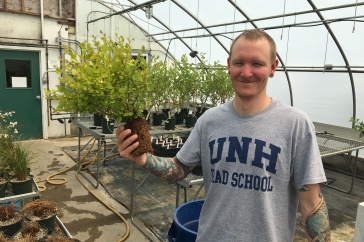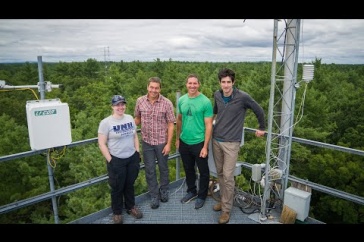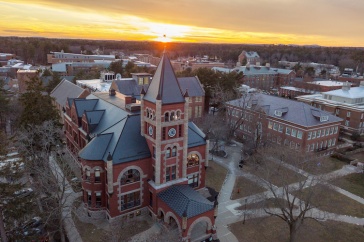
When Amanda Beal looks back on the journey that led to her doctoral work at UNH, a career with Maine Farmland Trust and her selection as the first woman commissioner of the Maine Department of Agriculture, Conservation and Forestry, the path seems clear.
Beal grew up on a dairy farm in Litchfield, Maine, and would go on to become an expert in the state on agriculture and sustainability. Maine Gov. Janet Mills announced her appointment on Jan. 20, and she was confirmed unanimously on Feb. 19.
“Over all of these experiences, I have developed a real interest in natural resource use in relation to food production and agriculture,” Beal says.
As commissioner, Beal is responsible for the state’s various land-based natural resources, including Maine agriculture, forests and parks and public lands. “There’s a lot of work that could be done to maximize opportunities for these different areas and to explore commonalities,” Beal says.
She credits her UNH studies, and more than two decades of working on agricultural issues throughout her professional career, with helping prepare her for the role: “Over the last four years, in particular, I’ve been engaged in working lands conservation as part of that work, but I still have a lot to learn around forestry,” she explains. “I do feel that I have a good starting base from my time at UNH, where I took classes that explored forest health and the importance of forests to our overall ecosystem and economy.”
Beal is currently at work on her dissertation in UNH’s natural resources and Earth systems science (NRESS) doctoral program, and it was that program that brought her to the university. “UNH was the right place for me because of the NRESS program,” she says. “I felt I needed to be in an interdisciplinary department where students were looking at natural resource based issues from many directions.”
“I’ve really enjoyed my time at UNH and the quality of the other students and faculty. I’ve had so many great interactions on my journey.”
“It has been an honor to serve Amanda as her advisor and graduate committee chair for the past several years,” says Professor Emeritus John Carroll. “When Amanda arrived here at UNH, she already had not only a distinguished graduate record at Tufts but she had also served as chair of the board of the Maine Organic Farmers and Gardeners Association, a demonstration of her leadership ability and, as well, her dedication to leading Maine agriculture.”
Beal served as president and CEO of Maine Farmland Trust from 2016 to until her confirmation as commissioner and was responsible for leading efforts to support farmers and revitalize Maine’s rural landscape by keeping agricultural lands working. She is also the co-author of “A New England Food Vision” and served as the By Land and By Sea coordinator for Maine’s Eat Local Foods coalition, where she developed and implemented a community-based action project to explore challenges and opportunities for collaboration between farms and fisheries.
Back to the Farm

Amanda Beal is in good company in her recent selection as Maine’s commissioner: UNH alumna Lorraine Stuart Merrill ’73 was nominated to be New Hampshire’s commissioner of agriculture in 2007 and served in that capacity for a decade.
Read More
With an increase in the number of farms in Maine, one of her goals as commissioner is to ensure farmers have access to good markets and fair prices for the work they’re doing. Amidst challenges around a changing climate, she says she wants to find ways for farms to adapt and be part of the mitigation strategy for addressing that important issue.
Her dissertation work is right in line with that effort. “We could grow a lot more food in New England, theoretically, and if we were to try to hit some of the targets in A New England Food Vision, we’d be looking at a lot more land coming back into production,” she explains. “At the heart of my dissertation is looking at those projections and ways to navigate large-scale land use change while ensuring watershed health. What we don’t want is to trade off productivity on land for productivity in the ocean and our waterways. The aim of my research is, ‘Do we know everything we need to know to maximize production without unintended consequences if our agricultural footprint were to expand exponentially in New England?’ These are questions we need to be asking ourselves over the next few decades.”
As her advisor, Carroll is looking forward to seeing what Beal will accomplish as commissioner.
“It is now most appropriate that she is being given the opportunity to serve in a public leadership capacity in the state she loves, especially given her roots in Maine dairy agriculture and the sustainable agriculture research she is now conducting,” he says. “Her work will serve all of New England's food security while directly and immediately serving the people of Maine, those who farm and those who eat.”
Learn more about graduate studies in UNH’s NRESS.
-
Written By:
Jennifer Saunders | Communications and Public Affairs | jennifer.saunders@unh.edu | 603-862-3585



















































